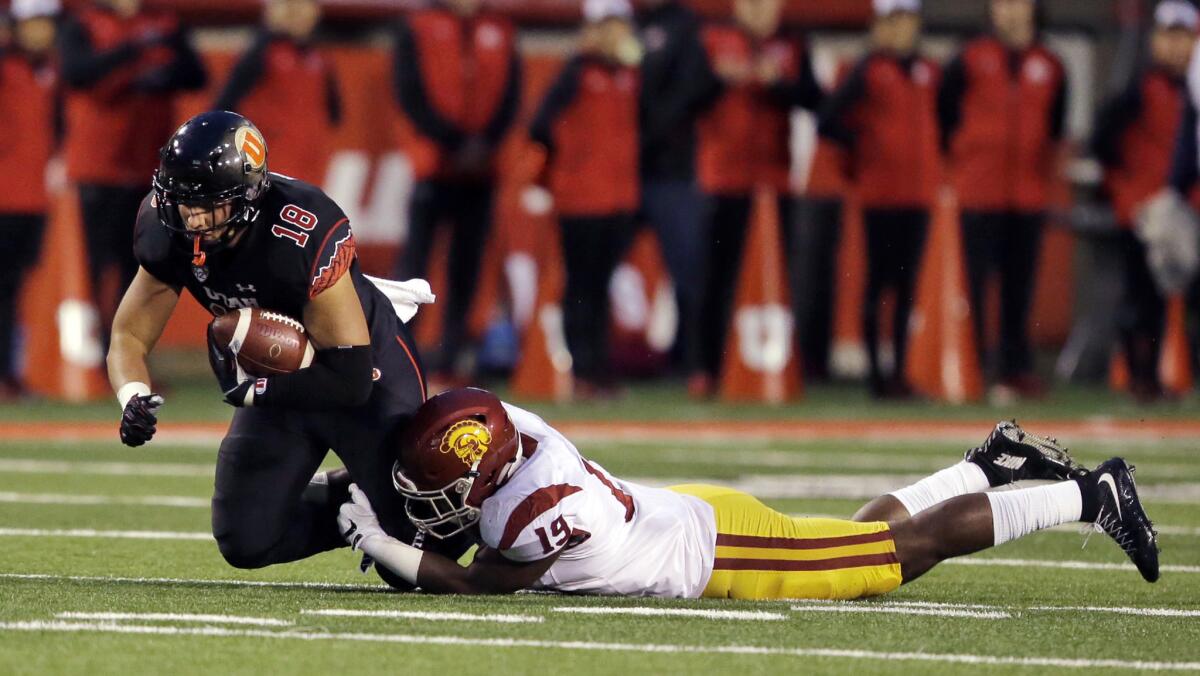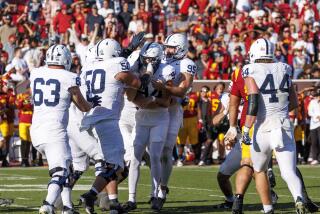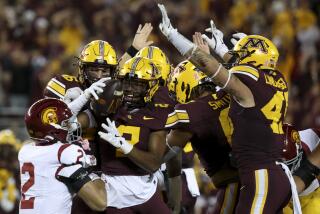Seeking another boost, USC looks to last season’s loss to Utah for lessons

- Share via
USC’s players do not talk much after a loss. The locker room is silent. If the team is on the road, no one says a word on the charter plane back home.
The last time USC played Utah, USC’s opponent Saturday in a key midseason Pac-12 Conference South division game, one person broke the silence in the postgame locker room.
“Everybody’s crying and stuff,” tight end Daniel Imatorbhebhe recalled. “And I just remember looking at him and saw that he was just solid. He was just like, ‘Guys, we’re gonna be fine.’ ”
Imatorbhebhe was talking about quarterback Sam Darnold. In a miserable, dramatic loss that dropped USC’s record to 1-3, the Trojans somehow had reason for hope. When the Trojans had no cause for optimism, Darnold washed them in confidence.
Imatorbhebhe remembers thinking in the locker room, “If he’s confident, then shoot … ”
The loss ultimately kept USC from the Pac-12 championship game, and it ended a slim shot at a spot in the College Football Playoff. It also marked a turning point. USC won its remaining nine games, including the Rose Bowl.
A year later, No. 13 USC (5-1, 3-1 in the Pac-12) enters its game against Utah (4-1, 1-1) in a different position. Its Pac-12 hopes and likely its playoff aspirations are in much better shape.
The Trojans do not have to turn around their record; they have to turn around their level of play. Several of their wins have been less than impressive. And USC’s resurrection after playing Utah a year ago provides some useful lessons.
“It reminds me a little bit of this year,” coach Clay Helton said. “I saw players getting better week in and week out.”
Many fans and pollsters would argue that USC has not shown steady improvement. On offense, that assertion is backed by diminishing yardage production. Helton said he would have been hard pressed to find anyone outside his coaching staff that saw much improvement early last season, either.
USC’s rebirth in 2016 was fueled by a rapidly improving defense and a team that came together to prevent collapse. Darnold taking over at quarterback was the most obvious upgrade, but the change went beyond him.
It began with a players-only meeting the day after the game.
“We really had an honest discussion, like what do we want to be?” tight end Tyler Petite said. “Do we want to be this team that keeps losing, an SC team that will go down in the history books as just not being very good? Or do we want to make something of our season?”
Players aired grievances, called each other out.
“I remember just meeting in here on Monday, it felt like things were different,” linebacker Cameron Smith said. “We believed in us. I guess it was the turning point then because we started winning after that.”
Darnold provided a dynamic presence leading the offense. The offense rushed for 83 more yards per game after the Utah game. The defense gave up seven fewer points per game.
This season, USC is again waiting on Darnold to be a savior. His efficiency and explosiveness have dipped slightly, and his interception rate has spiked. He has nine interceptions — equaling his total from last season — in 156 fewer attempts. He has been sacked 10 times, compared to six all last season.
Saturday’s game may again determine the Pac-12 South. Five South division teams have one loss in conference play, though USC has played two more games than the others.
Utah has one of the conference’s best front sevens on defense, and the Utes appear to be the most likely challenger to USC’s grip on the division.
Darnold admitted for the first time last week — after a win, no less — that he was frustrated, and he questioned USC’s play-calling.
Seeking to readjust his team’s focus, Helton had his players examine Clemson’s schedule from a season ago, when the Tigers won the national championship. Every game was not a masterpiece. Clemson won by just six points over Troy in Week 2. It needed overtime to defeat North Carolina State. It lost by a point to Pittsburgh.
Helton said the message was, “Instead of worrying about what’s out there way on down the line, just worry about what it takes to win this week.”
The rest, he said, would sort itself out.
He pointed to a fairly recent example that proved his point, when USC stopped worrying about the conference or the playoff and just worried about winning the next game.
It was last season, he said, after losing to Utah.
Follow Zach Helfand on Twitter @zhelfand
More to Read
Go beyond the scoreboard
Get the latest on L.A.'s teams in the daily Sports Report newsletter.
You may occasionally receive promotional content from the Los Angeles Times.







